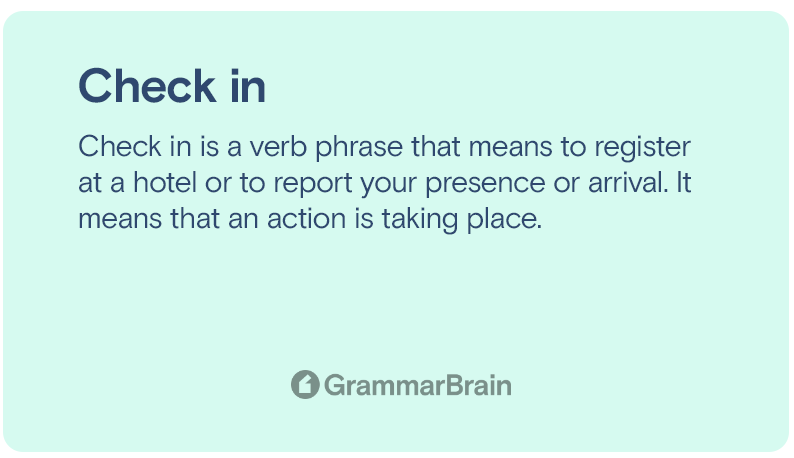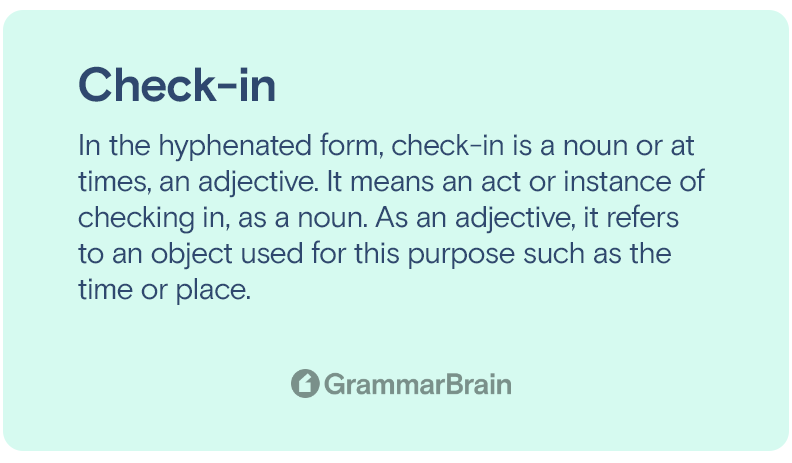Is it check in or check-in? Do travelers check in or check-in at hotels? Is that the check-in counter or the check in counter? Do I need to check in or check-in with her? It is very common for people to get confused about when and where to use these words.
Some words are versatile in the sense that they can be used as multiple parts of speech. This can be attributed to the absence and presence of the hyphen.
| Word | Definition |
| Check in | arrive and register at a hotel or airport. |
| Check-in | the act of reporting one’s presence and registering, typically at an airport or hotel. |
Which is correct, is it check in or check-in?
Both are correct and can get used in the proper context.

Meaning of Check in
Check in is a verb phrase that means to register at a hotel or to report your presence or arrival. It means that an action is taking place.
Other conjugated forms of check in are checked in and checking in.
When to use “Check in”
Travelers around the globe check in at hotels and airports. A class teacher can check in with the students to confirm assignment completion.
This phrase can also be used to get an update or to check up on something such as task completion, date, time, or the location to meet at.
Check in: Sentence Examples
Example 1: Passengers are requested to check in three hours before the flight schedule.
Example 2: Kindly check in at the reception desk, give your details and sign your name in the register.
Example 3: He has checked in at Heathrow Airport for a flight to Manchester and would land by the evening.
Example 4: She was checking in with the architects to get an update on her new home’s construction project.
Example 5: They headed to check in at the hotel for their 10 days vacation in Amsterdam.

Meaning of Check-in
In the hyphenated form, check-in is a noun or at times, an adjective. It means an act or instance of checking in, as a noun. As an adjective, it refers to an object used for this purpose such as the time or place.
When to use “Check-in”
Check-in can be used as either a noun or a phrasal adjective. It can describe an area or a place that was chosen for checking in.
Check-in can also be used in a manner such that it provides information on where and when a person will register upon arrival. It can also refer to the location or time to meet others.
Check-in: Sentence Examples
Example 1: He hurried off the bus to make advantage of the early check-in offer at the hotel and get some well-deserved rest after an 18-hour journey.
Example 2: There was a huge rush at the check-in desk in the hotel lobby on account of the Christmas vacation in New York.
Example 3: Due to the delayed check-in time on the hotel’s end, our family was upgraded to a suite.
Example 4: You need to reach latest by 12 pm, or else you will be charged a hefty check-in fee.
Example 5: We were offered the best chocolate chip cookies we ever had, as soon as we arrived at the check-in desk.
If you keep wondering how to use the words check in and check-in, remember that the word check is a verb. Without a hyphen, check in is used as a verbal phrase. With a hyphen, check-in can be used as a noun or an adjective. Also, reading more on the use of hyphens can help you gain a better understanding.
Inside this article
Fact checked:
Content is rigorously reviewed by a team of qualified and experienced fact checkers. Fact checkers review articles for factual accuracy, relevance, and timeliness. Learn more.
Core lessons
Glossary
- Abstract Noun
- Accusative Case
- Anecdote
- Antonym
- Active Sentence
- Adverb
- Adjective
- Allegory
- Alliteration
- Adjective Clause
- Adjective Phrase
- Ampersand
- Anastrophe
- Adverbial Clause
- Appositive Phrase
- Clause
- Compound Adjective
- Complex Sentence
- Compound Words
- Compound Predicate
- Common Noun
- Comparative Adjective
- Comparative and Superlative
- Compound Noun
- Compound Subject
- Compound Sentence
- Copular Verb
- Collective Noun
- Colloquialism
- Conciseness
- Consonance
- Conditional
- Concrete Noun
- Conjunction
- Conjugation
- Conditional Sentence
- Comma Splice
- Correlative Conjunction
- Coordinating Conjunction
- Coordinate Adjective
- Cumulative Adjective
- Dative Case
- Determiner
- Declarative Sentence
- Declarative Statement
- Direct Object Pronoun
- Direct Object
- Diction
- Diphthong
- Dangling Modifier
- Demonstrative Pronoun
- Demonstrative Adjective
- Direct Characterization
- Definite Article
- Doublespeak
- False Dilemma Fallacy
- Future Perfect Progressive
- Future Simple
- Future Perfect Continuous
- Future Perfect
- First Conditional
- Irregular Adjective
- Irregular Verb
- Imperative Sentence
- Indefinite Article
- Intransitive Verb
- Introductory Phrase
- Indefinite Pronoun
- Indirect Characterization
- Interrogative Sentence
- Intensive Pronoun
- Inanimate Object
- Indefinite Tense
- Infinitive Phrase
- Interjection
- Intensifier
- Infinitive
- Indicative Mood
- Participle
- Parallelism
- Prepositional Phrase
- Past Simple Tense
- Past Continuous Tense
- Past Perfect Tense
- Past Progressive Tense
- Present Simple Tense
- Present Perfect Tense
- Personal Pronoun
- Personification
- Persuasive Writing
- Parallel Structure
- Phrasal Verb
- Predicate Adjective
- Predicate Nominative
- Phonetic Language
- Plural Noun
- Punctuation
- Punctuation Marks
- Preposition
- Preposition of Place
- Parts of Speech
- Possessive Adjective
- Possessive Determiner
- Possessive Case
- Possessive Noun
- Proper Adjective
- Proper Noun
- Present Participle
- Prefix
- Predicate



